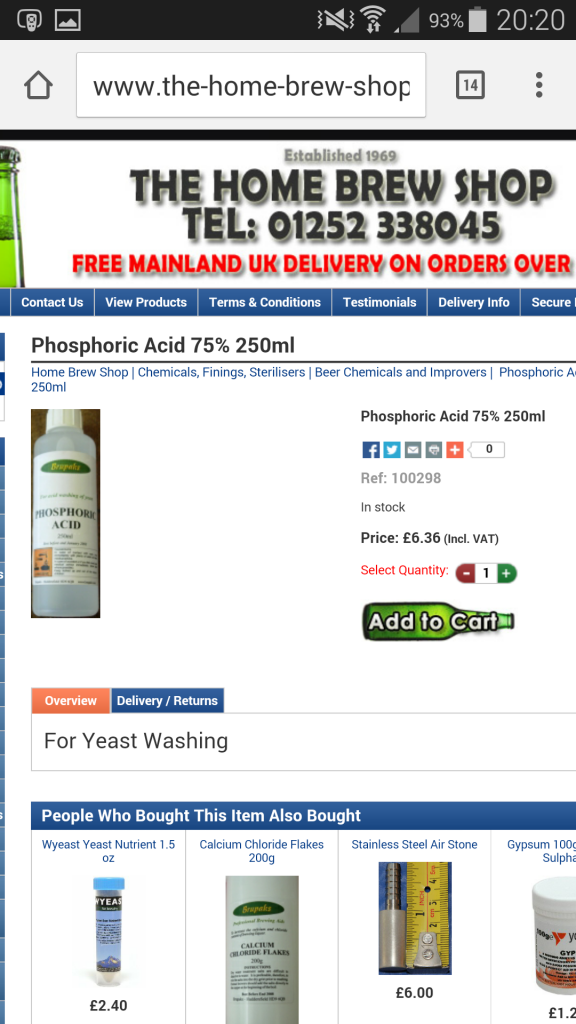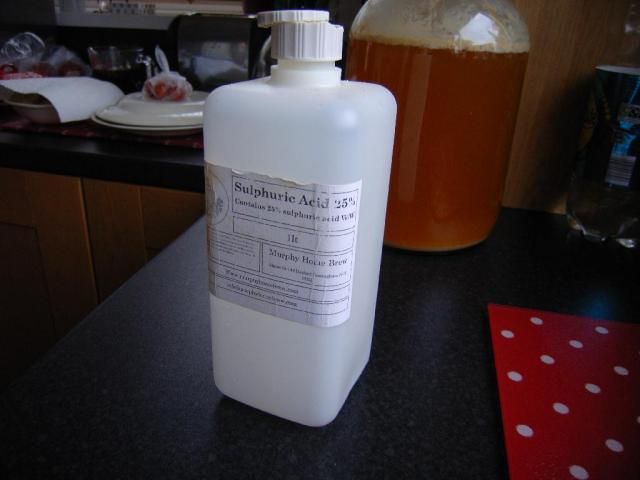
Phosphuric acid
Re: Phosphuric acid
Is this acid food safe and good for reducing alkalinity?
Re: Phosphuric acid
I hope so because I've been putting it in my liquor for years ! 
Re: Phosphuric acid
Nice one I'm gonna try it out my next brew and see what the difference is compared to using crs.
- Eric
- Even further under the Table
- Posts: 2918
- Joined: Fri Mar 13, 2009 1:18 am
- Location: Sunderland.
Re: Phosphuric acid
I suspect that acid might be Murphy's repackaged. Comparison of Brewpaks technical informatio sheet with that of Murphy and Son shows much in common. The product very probably is food safe as both advise using such and further, when you consider how small a proportion of the finished product that acid is, it shouldn't be too difficult these days to produce a product of the necessary standard. There was however a case over 100 years since when beer in Lancashire made using brewing sugar extracted locally with a sulphuric acid containing significant quantities of arsenic killed a number of heavy drinkers, so your precaution is wise. That acid is sold by both companies for the prime purpose of washing yeast to control bacterial contamination. They both sell another product for water treatment.
Could it be that phosphoric acid is used by home brewers in USA where it is commonly available while the acid combination supplied for many years by Brewbaks CRS or Murphys AMS in UK to homebrewers and breweries alike is not?
I do have phosphoric acid (as well as AMS, sulphuric and hydrochloric) and have used it for control of alkalinity, which it will do. However, I'm more content using those other acids with greater provenance of use in British beer manufacture. Apart from phosphoric acid depositing insoluble calcium phosphate (fish bone), only one third of it is used to reduce alkalinity, the remaining two thirds probably going little changed into the finished product as dihydrogen phosphate H2PO4. My other acids used to adjust alkalinity to levels commonly advised for brewing typical British beers leave no acid residue. Instead, the resulting sulphate and chloride salts are generally those we frequently add in the form of gypsum and calcium chloride flake. Can anyone remember reading anywhere that dihydrogen and calcium phosphate additions benefit beer?
Murphy and Son also provide phosphoric acid to the brewing industry for descaling, a purpose advised earlier in this thread. Now while Murphy's have shown recently to have some quality issues, they have been in the chemical industry supplying breweries for about a century and a quarter since they ceased brewing. I think that such a company is located in Nottingham is not unexpected, a city with castle built on soft and porous red sandstone and the River Trent whose waters passed through Burton and magnesium limestone on the other side under Mansfield which joins with Tadcaster and other brewing towns and regions, they were well located to play a major role consulting in beer manufacture. So why don't they sell an acid they stock to customers they have for a purpose they set up business to do?
Could it be that phosphoric acid is used by home brewers in USA where it is commonly available while the acid combination supplied for many years by Brewbaks CRS or Murphys AMS in UK to homebrewers and breweries alike is not?
I do have phosphoric acid (as well as AMS, sulphuric and hydrochloric) and have used it for control of alkalinity, which it will do. However, I'm more content using those other acids with greater provenance of use in British beer manufacture. Apart from phosphoric acid depositing insoluble calcium phosphate (fish bone), only one third of it is used to reduce alkalinity, the remaining two thirds probably going little changed into the finished product as dihydrogen phosphate H2PO4. My other acids used to adjust alkalinity to levels commonly advised for brewing typical British beers leave no acid residue. Instead, the resulting sulphate and chloride salts are generally those we frequently add in the form of gypsum and calcium chloride flake. Can anyone remember reading anywhere that dihydrogen and calcium phosphate additions benefit beer?
Murphy and Son also provide phosphoric acid to the brewing industry for descaling, a purpose advised earlier in this thread. Now while Murphy's have shown recently to have some quality issues, they have been in the chemical industry supplying breweries for about a century and a quarter since they ceased brewing. I think that such a company is located in Nottingham is not unexpected, a city with castle built on soft and porous red sandstone and the River Trent whose waters passed through Burton and magnesium limestone on the other side under Mansfield which joins with Tadcaster and other brewing towns and regions, they were well located to play a major role consulting in beer manufacture. So why don't they sell an acid they stock to customers they have for a purpose they set up business to do?
Without patience, life becomes difficult and the sooner it's finished, the better.
-
paulg
Re: Phosphuric acid
eric
can you point me in a direction of suppliers of sulphuric and hydrochloric acid .I know murphys supply one of them but I cant find food grade hydrochloric.I currently use phosphoric acid ,I also have CRS .I would need to get someone to bring it to me in the spring as Acid cant be sent by post abroad.
can you point me in a direction of suppliers of sulphuric and hydrochloric acid .I know murphys supply one of them but I cant find food grade hydrochloric.I currently use phosphoric acid ,I also have CRS .I would need to get someone to bring it to me in the spring as Acid cant be sent by post abroad.
- Eric
- Even further under the Table
- Posts: 2918
- Joined: Fri Mar 13, 2009 1:18 am
- Location: Sunderland.
Re: Phosphuric acid
A more knowledgeable person than I once advised this.paulg wrote:eric
can you point me in a direction of suppliers of sulphuric and hydrochloric acid .I know murphys supply one of them but I cant find food grade hydrochloric.I currently use phosphoric acid ,I also have CRS .I would need to get someone to bring it to me in the spring as Acid cant be sent by post abroad.
Mine is, no was, more concentrated and probably not so pure, but as I've already said, so little is used you'd need to find some really horrible acid and drink an awful lot of your beer to poison anyone.
Concentrated hydrochloric acid is really foul stuff if inhaled, not something to mess about. It's gas in solution that when at maximum saturation, about 37%, will freely find a way into your nasal passages when conditions allow. Dilute it at the first opportunity when it becomes quite different, but make sure you keep the cap tight. If someone is going to transport it across Europe, make sure they know what they are doing and take full precaution.
This is what happened to the top of my sulphuric acid.

Just to add, don't take any strength written on a label to be correct, do your own testing. A Salifert kit will help in this process.
Murphy's sulphuric acid is a particular case and it might be the bottle cap above was perfectly suitable for acid of the quoted strength.
Without patience, life becomes difficult and the sooner it's finished, the better.

